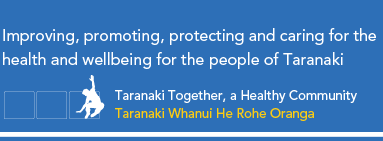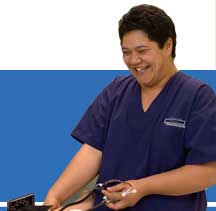Meningococcal Disease Cases Prompt Health Warning
3 Feburary 2012
Two confirmed cases of meningococcal disease reported this week have prompted a warning from Dr Greg Simmons, Taranaki DHB Medical Officer of Health, to both health professionals and the public to be alert for the signs and symptoms of the disease.
“Both cases were in young adults residing in New Plymouth but there are no apparent links between them. These are the first cases since two were reported on the same day at the end of November 2011,“ says Dr Simmons.
Meningococcal disease is caused by the bacterial germ Neisseria meningitidis. It can cause meningitis (infection of the membrane around the brain) or septicaemia (blood poisoning) and rarely, infection in other sties in the body. It is a serious disease and can sometimes cause death or permanent disability, such as deafness, loss of limbs and epilepsy. There are different groups of meningococcal bacteria, with group B being the most common in New Zealand (and about a quarter of the cases caused by group C).
Both cases are making a steady recovery. One has been confirmed as being caused by the group C meningococcal bacterium. Results on the other are awaited. Public health staff have identified close contacts of the cases and have offered them advice and preventative treatment.
Prompt treatment with antibiotics can prevent death or permanent disability. Dr Simmons is also urging doctors and others to keep a close eye on those who are unwell with flu-like symptoms, which can worsen rapidly.
“With the influenza season looming, it is important to remember that the early stages of meningococcal disease can appear as a flu-like illness. Meningococcal disease can progress very quickly. If an individual is sick, be vigilant and check them often. Don’t hesitate to seek medical attention without delay if your are concerned. If their condition worsens take them back to the doctor," said Dr Simmons.
Symptoms and signs of the disease vary, but in children and adults can include high temperature, headache, neck stiffness, muscle and joint pain, skin rash, vomiting, drowsiness and convulsions. Symptoms in babies can be more subtle and in addition to the above, may present as floppiness, refusing feeds, pale skin and high-pitched crying.
Young children, teenagers and young adults are most at risk of developing meningococcal disease. Anyone concerned that an illness may be meningococcal disease can obtain advice from Healthline (0800 611 116). More information on meningococcal disease can be found at:
- Ministry of Health http://www.moh.govt.nz/meningococcal.
- Immunisation Advisory Centre http://www.immune.org.nz/?T=665
For more information please call
Sue Carrington
Media Adviser
Ph 021 367 789
Last updated: Friday, February 3, 2012



